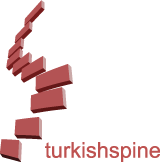ABSTRACT
History:
The development of epidural fibrosis is one of the most significant causes of failed back surgery syndrome. Many methods and substances have been used to prevent the development of postlaminectomy epidural fibrosis. Propolis is not only known to have positive effects on human health and regulatory properties, it also has accelerating and regulatory effects on wound healing.
Objective:
This study experimentally evaluated the effects of propolis on the degree of epidural fibrosis after laminectomy in rats.
Materials and Methods:
The subjects were separated into two groups: for group 1 (n=8), the control group, L1 laminectomy was performed, and for group 2 (n=8), the treatment group, L1 laminectomy with the application of propolis to the operation area was performed. The related vertebral columns were removed as a block after six weeks, and 6 mm sections were cut in paraffin blocks.
Results:
In group 2, a lower rate of epidural fibrosis developed, according to the degree of scar tissue, than in group 1. The difference was statistically significant (p<0.05). When staging was done according to the number of fibroblasts, in group 2 a low grade of epidural fibrosis was determined, and the difference was statistically significant (p<0.05).
Conclusion:
Many methods and substances have been used to prevent the development of postlaminectomy epidural fibrosis. Although there are many studies that have pointed out the beneficial effects of propolis on wound healing, this has never been used in neurosurgical practice. According to the results of this study, propolis reduces the development of post-laminectomy epidural fibrosis in rats. The standard formation of the gel must subsequently be tested in human studies.



